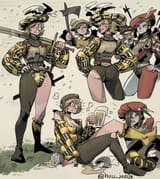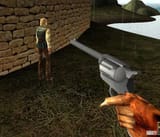>>96321235
If it's a rival nation, taking in refugees might cause additional issues. What might work better is if the nation is taking in refugees from a war they don't have any stake in. It neatly explains why they aren't addressing the source: they aren't involving themselves directly in the war.
So they have a bunch of refugees with no infrastructure or jobs to support themselves. So they offer contracts on goblins that no citizens wanted to bother with enough to risk the danger. But the refugees don't have a lot of options.
And it works, they clear goblin lands, the government swoops in and gains all kinds of lands and loot. An enterprising noble takes charge of the land and creates all different kinds of jobs, using the cheap refugee labor and granting them land. The other miscellaneous disenfranchised people see a better deal than squatting or petty theft and demand to join in as citizens. A system is designed organize the chaotic lot, likely run by the brightest of the refugees themselves. Now the noble continues his expansion and gives the biggest rewards to the most dangerous of tasks, killing off the fools and honing the skills of the talented.
And then other nobles in all the countries take notice of this effective and lucrative expansion into the wildlands formerly simply held at bay by soldiers. What used to be a constant necessary drain became a source of expansion and economic growth.
And there are opportunities to explore race relations if the refugees are of one race and are now relegated to only lesser guild work, hostile territories striking back, western marches, or whatever themes you want.
This what you get when you question aspects of your setting and figure out how it can make sense. Continually questioning and probing the setting provides opportunities for inspiration and creativity.
Shrugging off questions with generalizations or dismissive hand waving is lazy, inferior, and dull.
2/2






















